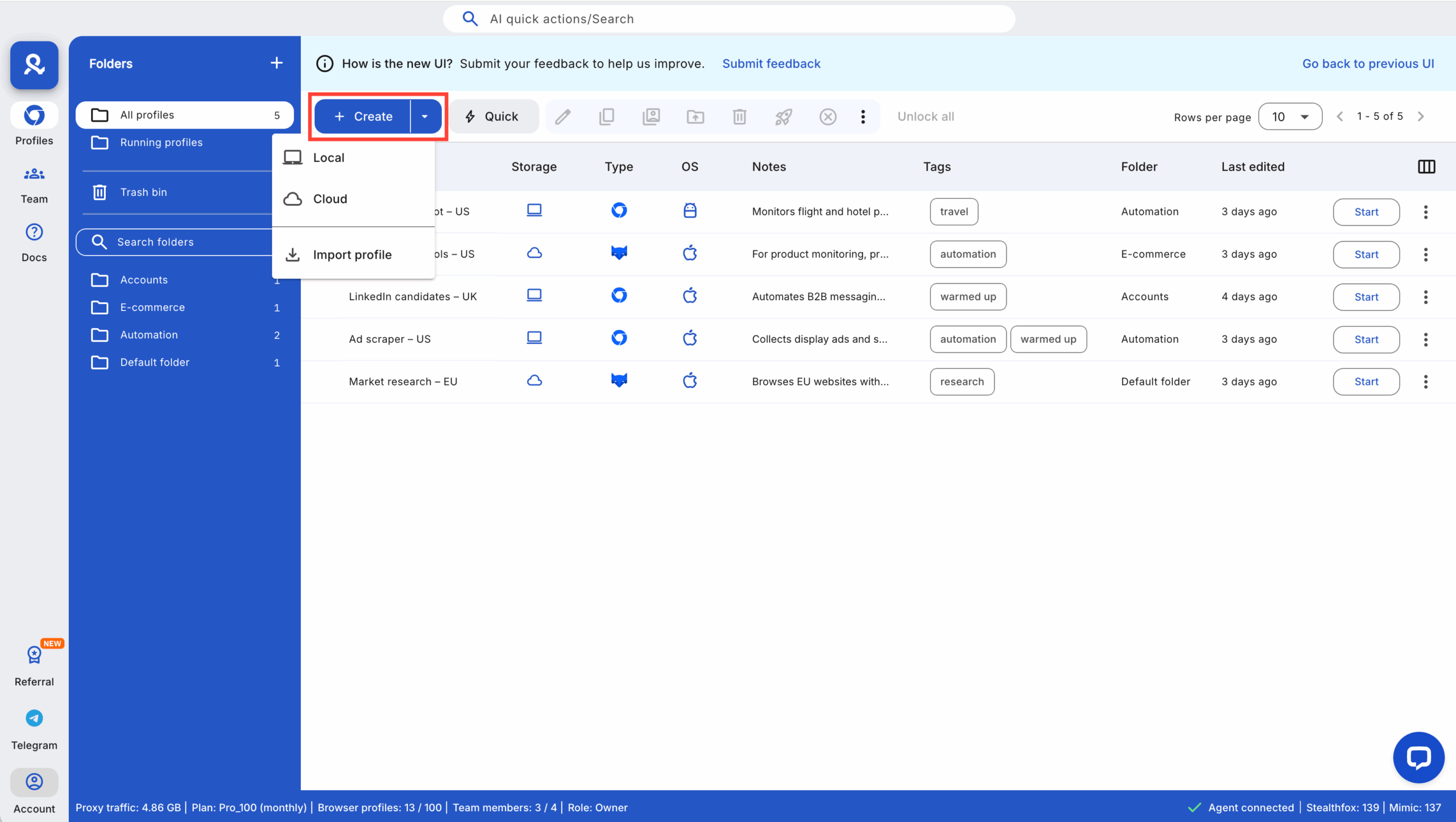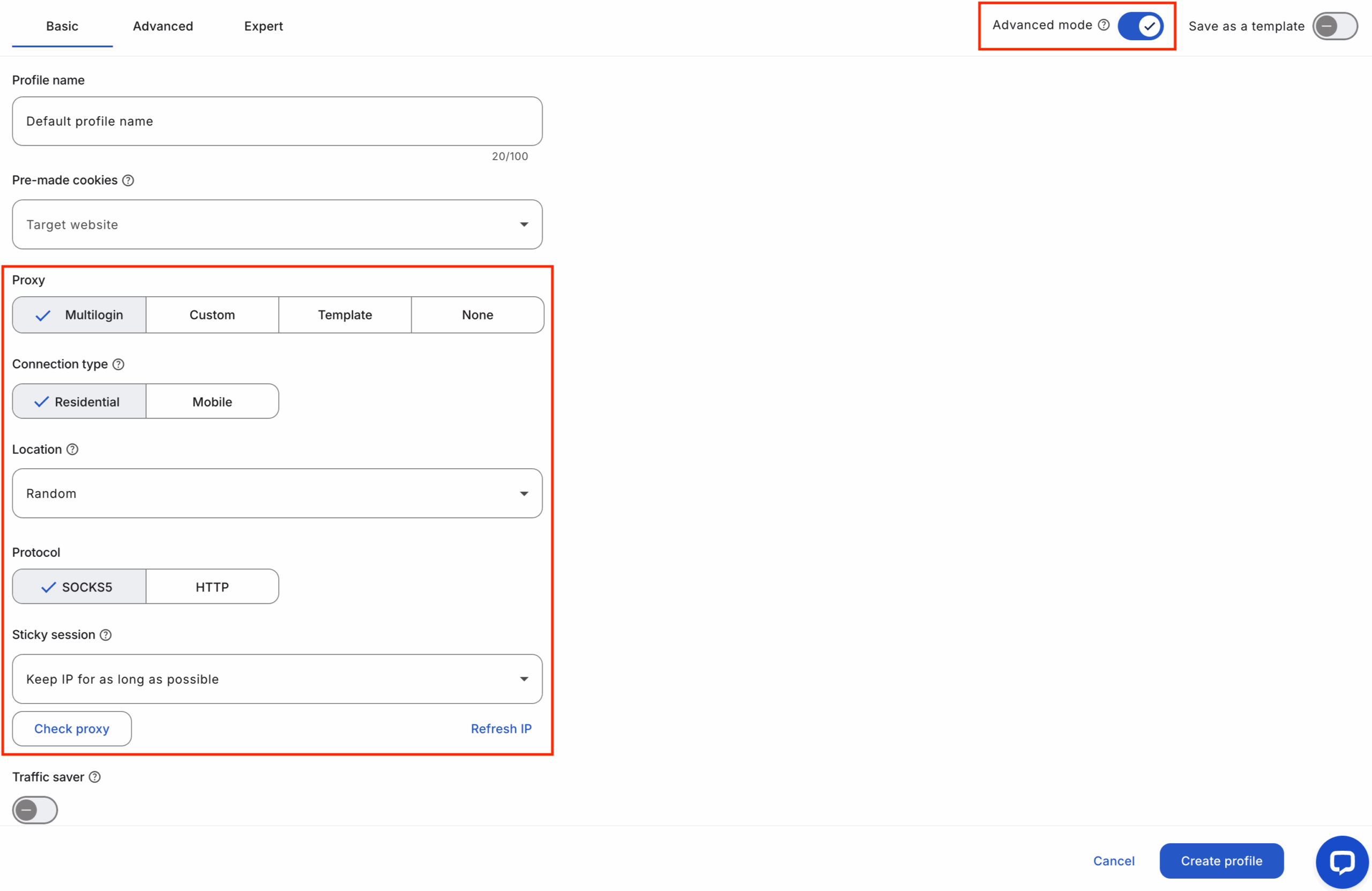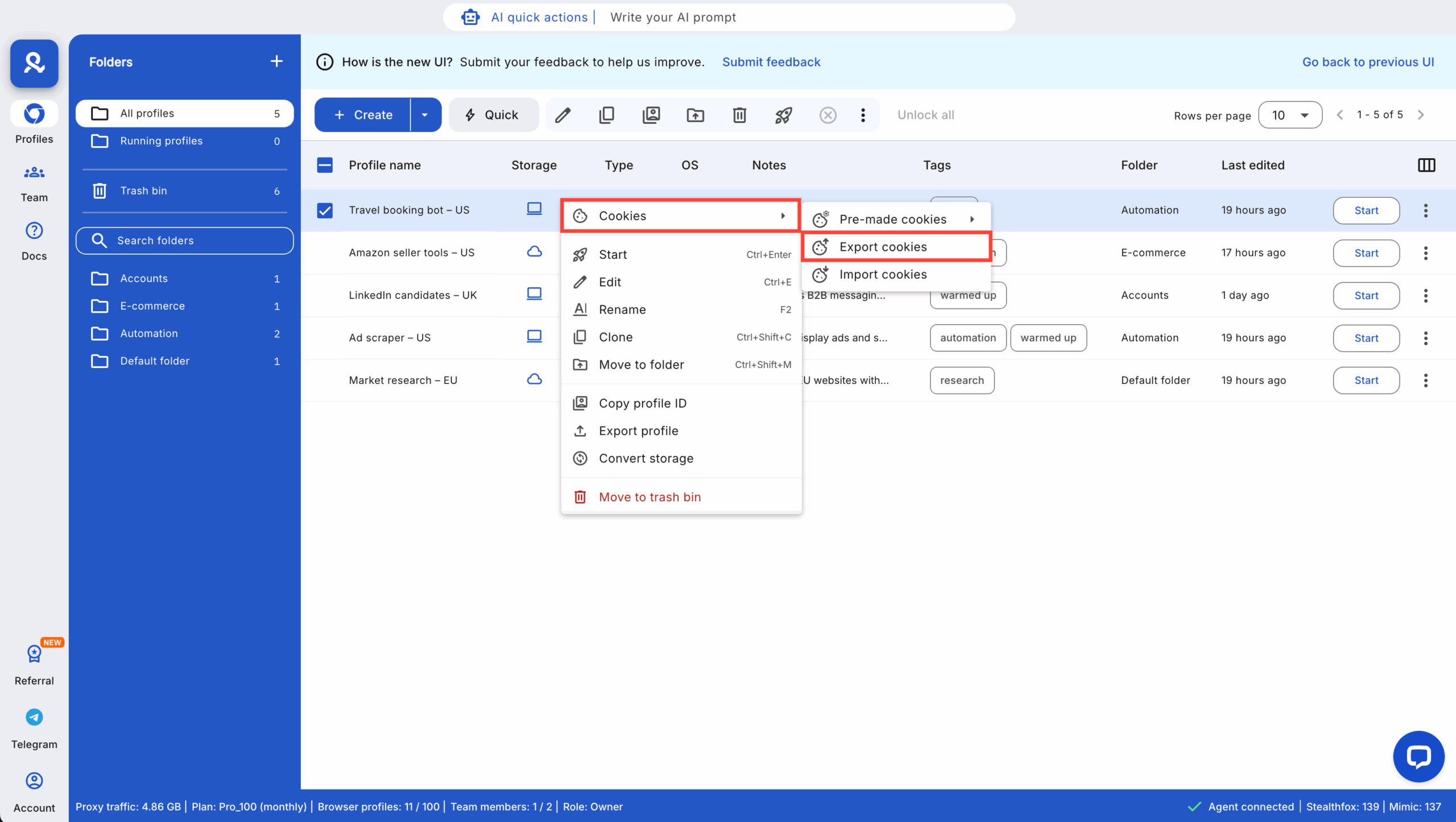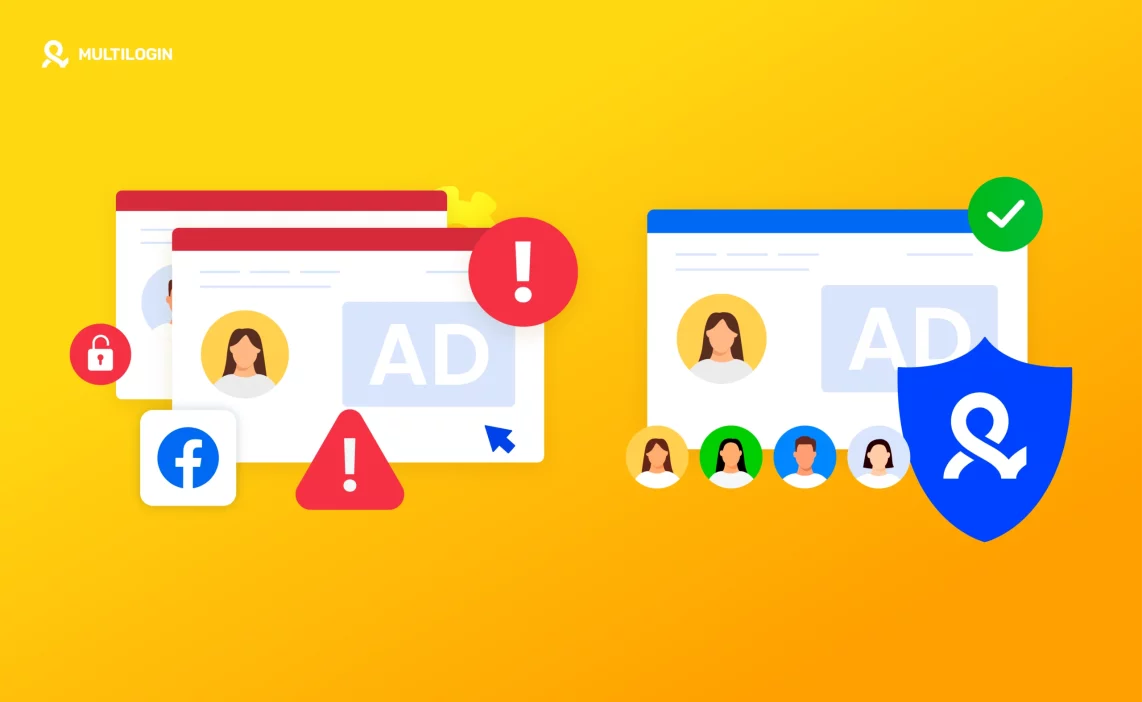One day your campaigns run fine; the next day they stop with a short “policy violation” or “suspicious activity” note and no clear reason. That sudden silence usually comes from hidden technical signals Facebook uses to link accounts — not always from the ad copy itself. Advertisers trying to create multiple Facebook accounts often run into this problem even faster, since accounts look connected when managed from the same setup.
TL;DR: If your Facebook ad accounts keep getting suspended, this guide shows the five most common signals that cause bans — and gives step-by-step fixes you can apply today (including a free checklist and a demo of how Multilogin isolates fingerprints, proxies, and cookies).
In this article you’ll learn:
The 4 most common triggers of Facebook bans
Step-by-step fixes you can implement now
How to use Multilogin profiles, dedicated proxies, and cookie isolation to reduce linkage and keep campaigns running
The hidden issue: account linking
Even if you run compliant ads, use real payment methods, and avoid risky niches, your accounts can still get banned. That’s because Facebook doesn’t only judge the ads you publish — it tracks how you manage them.
The platform constantly looks for connections. It checks your browser setup, the IPs you use, and whether accounts are being handled in ways that look related. If it finds a pattern, accounts start getting linked together, and once one goes down, the rest usually follow.
Some of the main signals Facebook watches:
1. Device and browser fingerprints
Every browser has a unique fingerprint (screen size, fonts, time zone, graphics rendering). If multiple accounts share the same fingerprint, Facebook assumes they belong to the same person.
How Multilogin fixes it:
Each Multilogin profile comes with its own fingerprint template (Windows, macOS, Linux). These templates are statistically natural, so profiles look like different, real devices instead of clones.
Do this now:
In Multilogin, click Create new profile.
Pick a fingerprint template from the dropdown.
Save and launch — the profile opens with its own unique identity.

2. IP addresses and login locations
Logging in from different cities or switching between random IPs makes Facebook suspicious. If two accounts show the same IP history, they get linked.
How Multilogin fixes it:
Each profile can be assigned a dedicated residential proxy. You choose the country or city, and the account always logs in from the same clean IP.
Do this now:
Go to the profile’s Proxy settings.
Select Residential proxy.
Pick the recommended geo (e.g., US → New York).
Save. Now that profile always opens with that IP.

3. Cookies or browsing data overlap
Cookies, cache, and local storage carry account history. If two accounts share these, Facebook links them instantly.
How Multilogin fixes it:
Profiles in Multilogin are fully isolated. Each one stores its own cookies, cache, and local storage — nothing leaks across. You can even import pre-farmed cookies to warm up new accounts.
Do this now:
Keep one Facebook account per profile.
Use Pre-cookies when creating fresh profiles.
Never reuse the same profile for another account.

4. Ads or activity patterns
Negative feedback, sudden spending spikes, or identical automation patterns across accounts can look like abuse.
How Multilogin fixes it:
Profiles integrate with Puppeteer, Playwright, and Selenium. You can randomize actions (scrolls, clicks, delays) so accounts behave naturally and independently.
Do this now:
Connect your automation tool to Multilogin’s local API.
Randomize behaviour per profile (e.g., stagger spend increases).
Monitor each account separately instead of running identical scripts.

Read our guide on how to buy warmed-up facebook accounts!
Start your Multilogin trial for just €1.99 and see how easy it is to keep your ad accounts safe from bans.
Why normal setups fail
Most bans don’t happen because you broke the rules. They happen because your setup looks suspicious to Facebook.
- When you run several accounts in the same browser, Facebook sees the shared fingerprint and flags them as connected.
- Switching proxies isn’t enough. The IP changes, but the browser fingerprint stays the same, so accounts are still linked.
- VPNs or incognito mode don’t give real isolation. Facebook can still track cookies, device details, and behavior patterns.
This is why so many advertisers lose account after account, even when they think they’re being careful. Without a proper way to separate accounts, Facebook will always find the link.
How Multilogin helps prevent Facebook Ad account bans?
The main reason Facebook bans ad accounts isn’t always the ad itself. It’s usually because accounts look connected. When you run several accounts from the same browser, reuse the same fingerprints, or share cookies and IP addresses, Facebook links them together. Once one gets banned, the rest fall like dominoes.
This is where Multilogin antidetect browser solves the problem. Instead of trying to hide with quick fixes like proxies or VPNs, Multilogin creates an environment that looks and behaves like a real, separate user every time.
Here’s how it works:
Unique browser profiles – Every account runs inside its own isolated profile with a fresh fingerprint. Facebook reads them as independent users.
Smart cookie management – Each profile keeps its own cookies and browsing data, so accounts never overlap. On top of that, Multilogin lets you use pre-formed cookies (aged browsing histories) to warm up new accounts and make them look trustworthy from the start.
Built-in residential proxies – Every plan includes premium residential IPs. Assign one proxy per profile so accounts look local and stay stable, without relying on third-party providers.
Safe team collaboration – Share accounts with teammates while keeping permissions separated and activity clean.
Automation support – Use Puppeteer, Selenium, or Playwright to run and scale campaigns without breaking Facebook’s detection rules.
Because these profiles mimic natural human behavior, Facebook’s systems see each account as an independent user. This removes the hidden links that usually trigger bans.
With Multilogin, you don’t waste time fighting random suspensions or rebuilding accounts from scratch. You get reliability, stability, and peace of mind — whether you’re running a single campaign or scaling a team across thousands of profiles.
Case study
Before: A small e-commerce brand saw three ad accounts suspended within six weeks. The issue was traced to overlapping browser fingerprints and shared login IPs.
Action: They moved each account into its own Multilogin profile, assigned dedicated residential proxies by country, and isolated cookies per profile.
After (90 days): No new suspensions occurred, campaigns ran continuously, and reporting stabilized across all accounts.
This anonymized example represents a typical outcome when proper profile isolation is applied. Results depend on account history, compliance, and practices. Always follow Facebook Ads policies and local laws.
Watch: how to set up multiple Facebook accounts in minutes with Multilogin
The Verdict: Facebook ad account bans
Facebook bans are frustrating, but they aren’t random. Most suspensions come down to patterns Facebook detects between accounts. If you keep running everything through the same setup, those patterns will always get picked up and your accounts won’t last. The only real way to keep ad accounts alive is to separate them properly so they look like independent users. That’s exactly what Multilogin is built to do — giving each account its own fingerprint, IP, and browser environment so you can run ads with confidence instead of worrying about the next ban.
FAQs about Facebook ad account bans
Facebook bans ad accounts fast because its system is automated. It looks for patterns that suggest risk — like suspicious payments, repeated rejections, or accounts that seem linked. The platform usually sends a short notice but won’t explain the full details. That’s why so many advertisers feel blindsided. Tools like Multilogin help reduce these risks by keeping each account isolated with its own browser profile and proxy, so they don’t get flagged as connected.
The main triggers are policy violations, bad ad feedback, payment issues, and abnormal activity. But one of the biggest hidden reasons is account linking. If Facebook sees accounts being run from the same device, IP, or browser setup, it assumes they belong to the same owner. Multilogin solves this by giving each account its own fingerprint, cookie storage, and IP — making them appear as separate, unrelated users.
Facebook checks browser fingerprints, IP addresses, login locations, cookies, and behavior. If any of these overlap across accounts, Facebook connects the dots. That’s why bans often happen in chains. Multilogin prevents this by separating those signals. Each account runs in its own browser profile, with its own proxy and data, so there’s nothing for Facebook to tie together.
Yes. If accounts share the same setup, Facebook often bans them together. Even if only one ad triggers the ban, the system assumes all related accounts are unsafe. Multilogin breaks that chain. By running each account in a separate environment, one ban doesn’t automatically pull down the rest.
Sometimes. If the ban was caused by a mistake or a false positive, you can appeal through Facebook’s review process. But if the account broke policy or was linked to other banned accounts, recovery is rare. Most advertisers prepare backup accounts to avoid losing everything at once.



